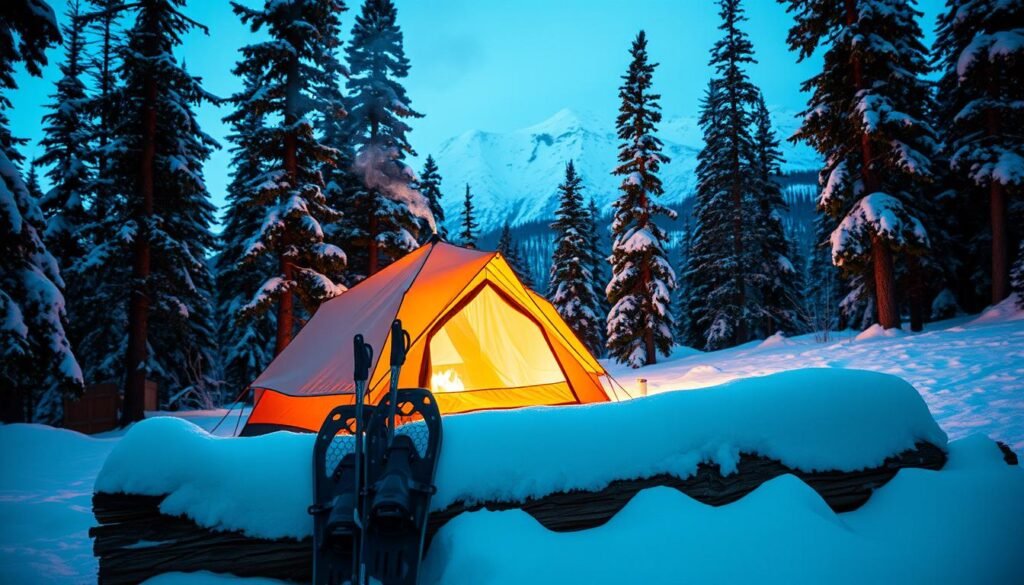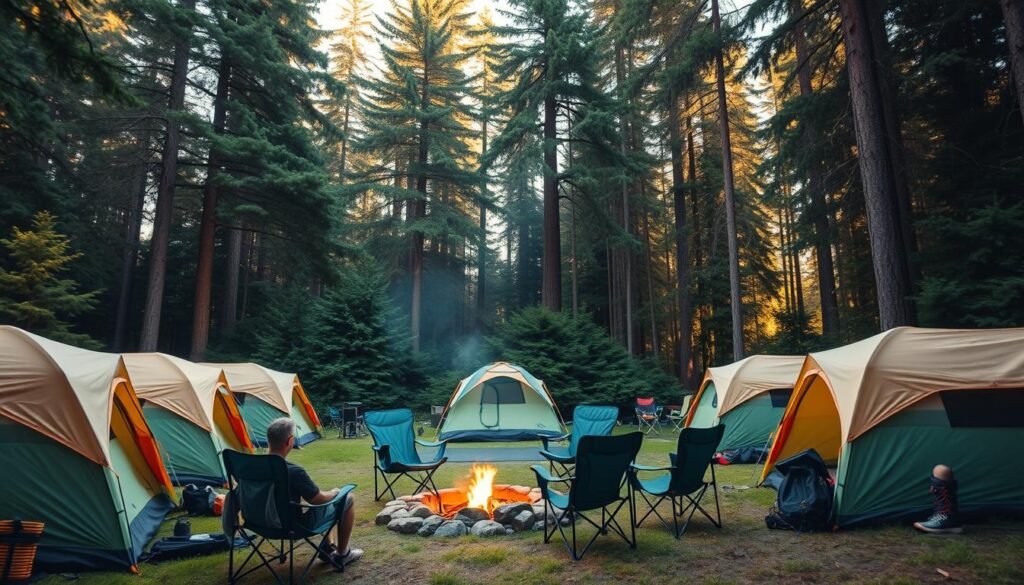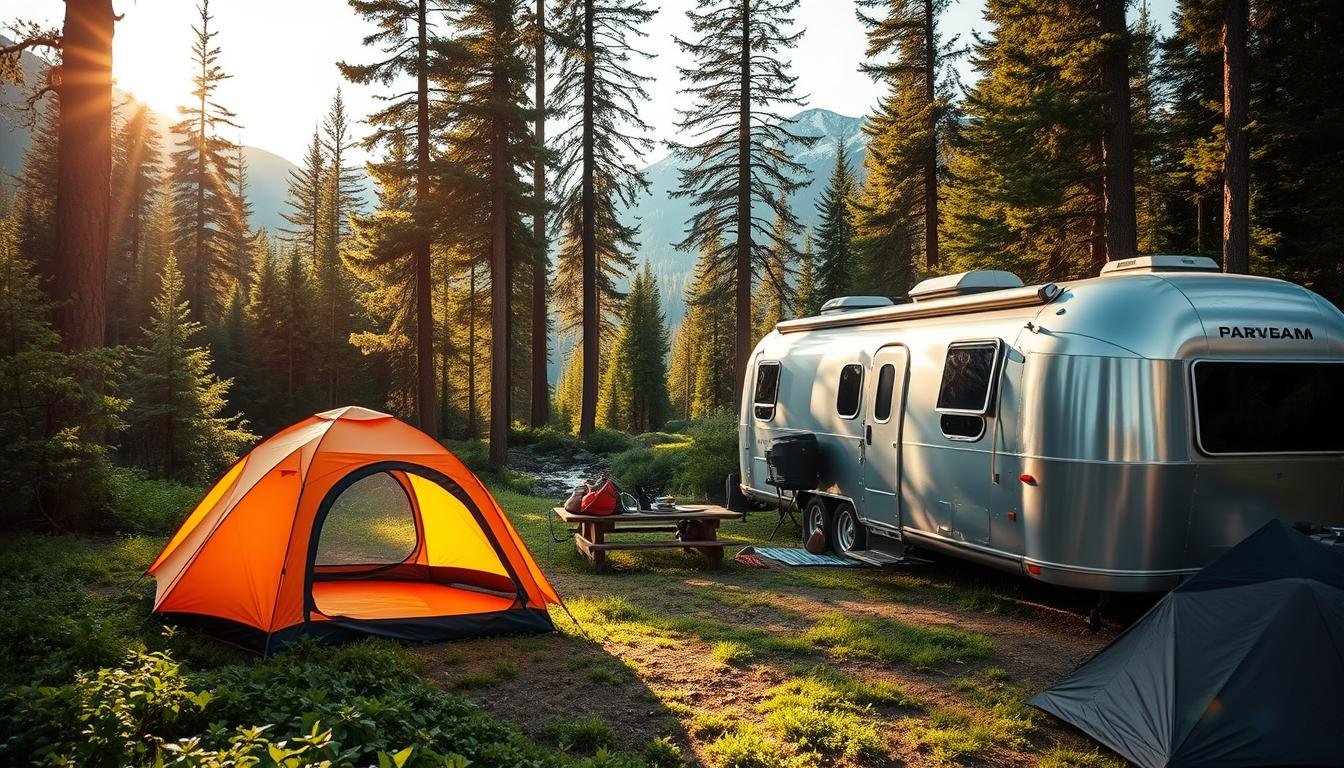Canada’s vast wilderness is perfect for camping adventures. With over 400 parks and reserves, you have many choices. But, should you open your RV door or unzip a tent?
Choosing between tent camping and RV camping depends on several things. Your budget, comfort level, and the experience you want are key. Some love the simplicity and nature of tent camping. Others prefer the comforts and ease of RV camping.
Key Takeaways
- Consider your budget before choosing between tent and RV camping.
- Think about the level of comfort you need for your camping trip.
- Research campsites that suit your chosen camping style.
- Plan for the type of experience you want to have.
- Check the weather forecast before heading out.
The Appeal of Canadian Wilderness: Why Camp in Canada?
Canada’s vast wilderness is a dream for campers. It offers adventure and peace. The country’s landscapes, from rugged coastlines to majestic mountains, are perfect for outdoor lovers.
Canada’s Diverse Camping Landscapes
Canada’s camping spots are as varied as they are stunning. You can camp in British Columbia’s mountains or Prince Edward Island’s hills. Each place offers a unique camping adventure.
- Coastal camping in Nova Scotia, with its dramatic shoreline views
- Mountain camping in Alberta, with access to world-class hiking trails
- Forest camping in Quebec, surrounded by the serene beauty of boreal forests
The Growing Popularity of Canadian Camping Adventures
Camping in Canada is becoming more popular. People want outdoor adventures and Canada’s vast wilderness offers them. Camping here means connecting with nature, challenging oneself, and making memories.
“Connecting with nature, challenging oneself physically, and creating lasting memories with family and friends.”
What Makes Canada Unique for American Campers
Canada is a great choice for American campers. It’s a foreign place that’s easy to get to and feels familiar. The country’s diverse landscapes and activities offer a new camping experience.
| Camping Aspect | Canada | United States |
|---|---|---|
| Landscape Diversity | Wide range of ecosystems, from tundra to temperate rainforests | Diverse, but less variety in certain regions |
| Accessibility | Easily accessible for Americans, with minimal language barriers | N/A |
| Cultural Experience | Offers a mix of familiar and unique cultural experiences | Familiar cultural context |
Canada’s natural beauty, ease of access, and cultural appeal make it a top choice for campers. Whether you love the Canadian Rockies or the Maritime provinces, camping in Canada is unforgettable.
Understanding Your Camping Style: What Matters Most to You
Camping in Canada offers many experiences. But it all starts with knowing your camping style. Whether you’re a seasoned camper or new to it, knowing what you value most can help plan your trip.
Defining Your Camping Priorities
People have different camping priorities. Some love solitude and nature, while others seek comfort and amenities. Think about what you enjoy most and what you’re okay with giving up.
For a rugged experience, tent camping might be best. But if you want amenities like showers, RV camping is better.
Assessing Your Experience Level
Your camping experience level is key. Beginners might prefer RV camping for its comfort. More experienced campers might enjoy tent camping’s challenge and nature connection.
Considering Your Travel Companions
Who you’re camping with matters a lot. Camping with family or solo changes your experience.
Family Considerations
Camping with family means considering everyone’s needs, including kids. RV camping offers more space and amenities for families. But tent camping can also be great for bonding, with the right gear and attitude.
Solo Travel Dynamics
Solo travelers might value mobility and flexibility more. Tent camping is great for solo travelers, allowing for easy movement and a closer nature connection.
| Camping Aspect | Tent Camping | RV Camping |
|---|---|---|
| Experience Level | Suited for experienced campers | Ideal for beginners or families |
| Amenities | Basic, with an emphasis on nature | Offers more comfort and amenities |
| Travel Companions | Flexible, suitable for solo or groups | Particularly suitable for families or groups |
Tent vs RV Camping in Canada: Which is Better?
Choosing between tent and RV camping in Canada depends on your preferences. Both offer unique experiences for different needs.
The Fundamental Differences
Tent camping is simple and close to nature. You set up a tent in remote areas and enjoy the quiet. RV camping, on the other hand, is more luxurious. It has amenities like comfy mattresses and kitchens.
Key differences between tent and RV camping include:
| Feature | Tent Camping | RV Camping |
|---|---|---|
| Setup and Mobility | More labor-intensive to set up; generally more mobile | Easier to live in once set up; less mobile due to size |
| Amenities | Basic; often requires external facilities for showers and toilets | Luxurious; often includes kitchen, bathroom, and sleeping facilities |
| Cost | Generally less expensive upfront and in terms of maintenance | More expensive upfront; maintenance and fuel costs add up |
Who Each Option Appeals To
Tent camping is for those who love the outdoors and are on a budget. It’s perfect for solo travelers, couples, or small families. They don’t need many comforts.
RV camping is for families, retirees, or anyone who wants home comforts while camping. It’s great for longer trips where you want to feel at home.
The Canadian Context: Unique Considerations
Canada’s vast landscapes offer unique camping spots. Tent campers find secluded spots in national and provincial parks. RV campers enjoy exploring on well-maintained roads and RV-friendly campsites.
Weather is a big factor in Canada, with cold summers in some areas. RVs protect you better from the weather. Tent campers need the right gear.
Cost Comparison: Budget Implications of Tent and RV Camping
Planning a camping trip in Canada means thinking about the cost. Tent and RV camping offer different experiences with varying budgets. This can greatly affect your trip expenses.
Initial Investment Costs
Tent camping starts with a lower cost. You need a tent, sleeping bag, and basic gear, costing a few hundred dollars. RV camping, on the other hand, requires a big upfront investment. RV prices range from $20,000 to over $100,000, depending on size and features.
Ongoing Expenses
Both tent and RV camping have ongoing costs. RV camping expenses are more significant.
Fuel and Transportation
Fuel costs for RV camping can be high, due to long Canadian distances. Fuel prices vary by RV efficiency and travel distance. There are also RV maintenance costs like servicing and repairs.
Campsite Fees Across Provinces
Campsite fees differ by province in Canada. National parks and popular spots charge more, often during peak season. It’s key to budget for these fees in advance. Tent campers pay less, but fees add up for longer stays.
Hidden Costs to Consider
There are hidden costs to think about in Canada. RV campers face costs for gear storage, RV upgrades, and waste dumping. Tent campers might spend on gear maintenance or food storage to avoid wildlife.
Knowing these costs helps decide between tent or RV camping based on budget. By looking at both initial and ongoing costs, you can plan a better camping trip in Canada.
Comfort and Convenience: Living Conditions Compared
Choosing between tent and RV camping in Canada affects your comfort and convenience. The living conditions of your campsite can greatly impact your outdoor adventure.
Sleeping Arrangements
Tent camping offers a traditional outdoor experience. You sleep on the ground with sleeping bags and pads. RV camping, on the other hand, provides a luxurious sleep experience. It has beds and climate control, perfect for those who want home comfort in the wilderness.
Weather Protection in Canadian Conditions
Canadian weather can change quickly, from rain to extreme cold. Tents offer basic protection, but RVs provide better shelter. They have insulation and sometimes generators for electricity.
Amenities and Facilities
The amenities available greatly impact your camping experience. RVs have many comforts, while tent campers use campground facilities.
Bathroom and Shower Access
RV camping offers bathroom facilities in the vehicle, great for remote areas. Tent campers use campground facilities, which vary in quality and availability.
Cooking and Food Storage
RVs have kitchens or basic cooking facilities, making meal prep easier. Tent campers use portable stoves or grills and store food in coolers to keep it fresh.
In conclusion, the choice between tent and RV camping in Canada depends on your preferences. Do you prefer the simplicity and nature of tent camping, or the comfort of RVs?
Mobility and Accessibility: Getting Around Canada
Planning a camping trip in Canada means knowing about mobility and accessibility. The vast landscapes offer many camping spots. But, choosing between tent and RV camping affects how you get around.
Navigating Canadian Roads and Terrain
Canada’s roads and terrain can be tough, mainly for RVs. Major highways are good, but rural areas have rough roads. Tent campers can reach places RVs can’t.
Key considerations for RV campers include:
- Road conditions and maintenance
- Bridge weight limits
- Clearance under low-hanging branches or power lines
Access to Remote Locations
Tent camping lets you explore remote spots easily. You don’t need big vehicles or complex setups. RVs, though comfy, are limited by their size.
For those seeking solitude, tent camping in remote areas can be rewarding.
Campsite Availability and Restrictions
Campsite rules change across Canada. Knowing these rules is key for planning.
Provincial Park Systems
Provincial parks offer different camping experiences. You can find backcountry sites or developed campgrounds. Each province has its own rules for RVs, generators, and how long you can stay.
National Park Considerations
National parks in Canada are beautiful and full of wildlife. But, they have strict rules to protect nature. RVs might face size and generator limits. Tent campers need to follow rules for food and waste.
Understanding mobility and accessibility helps campers plan better. They can pick the best option for their trip.
Environmental Impact: Eco-Friendly Considerations
Camping in Canada is getting more popular. It’s important to know how tent and RV camping affect the environment. We should try to leave as small a mark as possible on nature.
Carbon Footprint Comparison
Tent camping is better for the planet than RV camping. RVs need a lot of energy to make and use. Tents, on the other hand, are made of lighter materials and don’t harm the environment as much.
Carbon Footprint Factors:
| Factor | Tent Camping | RV Camping |
|---|---|---|
| Manufacturing Impact | Lower | Higher |
| Fuel Consumption | Minimal | Significant |
| Waste Generation | Less | More |
Leave No Trace Principles in Canadian Parks
It doesn’t matter if you’re in a tent or an RV. Following Leave No Trace is key to keeping Canada’s nature beautiful. This means planning, staying on paths, and throwing away trash properly.
“Leave nothing behind but bubbles and take nothing but memories.” This saying sums up Leave No Trace. It tells us to leave the environment as we found it.
Sustainable Camping Practices
Using eco-friendly gear and saving water are important for camping. RV users can help by using solar panels and using less water. These steps reduce our impact on the environment.
By choosing to camp sustainably, we can enjoy Canada’s outdoors. And we can make sure it stays beautiful for others in the future.
Seasonal Considerations: Camping Year-Round in Canada
Camping in Canada is fun all year round. Each season brings its own charm and challenges. Campers need to be ready for different weather, whether they’re in a tent or an RV.
Summer Camping Comparison
Summer is the best time for camping in Canada. The weather is warm, and days are long. This makes it perfect for outdoor fun. But, it also means more people and higher prices.
Summer camping advantages include warm weather and lots of daylight. You can enjoy hiking, fishing, and swimming. Yet, the crowds and prices can be a drawback.
Shoulder Season Considerations
The shoulder season, spring and fall, is quieter. The weather can be unpredictable, with cooler temps and rain or snow. But, the scenery is stunning, with blooming flowers and colorful leaves.
Shoulder season camping is great for those who like peace and lower costs. Be ready for changing weather and possible site closures.
Winter Camping Possibilities
Winter camping in Canada is special, with snow and frozen lakes. It’s peaceful but needs careful planning and the right gear.
Winter RV Preparation
For RV campers, winter means getting your vehicle ready. Use winter tires, insulate pipes, and have a good heater. Pick campsites that are easy to reach in winter.
Cold Weather Tent Camping Challenges
Tent camping in winter is tough due to the cold and snow. You’ll need special gear like four-season tents and warm clothes. Choose a site that protects you from the weather.

Camping in Canada is always an adventure, no matter the season. Knowing what each season offers helps you plan the perfect trip.
Regional Spotlight: Best Places for Tent Camping in Canada
Canada’s vast wilderness is perfect for tent camping. From British Columbia’s rugged mountains to Ontario’s serene lakes, each area offers a unique adventure.
West Coast Wonders: BC and Yukon
The West Coast of Canada, including British Columbia and the Yukon, is known for its stunning landscapes and wildlife. Tent campers can enjoy:
- Pacific Rim National Park Reserve in BC, with its ancient forests and rugged coastline.
- Kootenay National Park in BC, where you can camp amidst stunning mountain scenery.
- Kluane National Park Reserve in Yukon, famous for its towering mountains and glaciers.
Rocky Mountain Treasures: Alberta and Eastern BC
The Rocky Mountains offer some of Canada’s most spectacular camping spots. Key destinations include:
- Banff National Park in Alberta, with its picturesque mountain lakes and abundant wildlife.
- Jasper National Park in Alberta, known for its dark skies and glacier-hiked mountains.
- Mount Revelstoke National Park in BC, where you can camp with stunning mountain views.
| Park | Location | Notable Features |
|---|---|---|
| Pacific Rim National Park Reserve | BC | Ancient forests, rugged coastline |
| Banff National Park | Alberta | Mountain lakes, abundant wildlife |
| Kluane National Park Reserve | Yukon | Towering mountains, glaciers |
Prairie Camping: Saskatchewan and Manitoba
The prairies offer a unique camping experience. With vast open spaces and serene landscapes, they are perfect for a different kind of adventure. Popular spots include:
- Prince Albert National Park in Saskatchewan, known for its boreal forest and abundant wildlife.
- Riding Mountain National Park in Manitoba, where you can camp in both prairie and forest settings.
Eastern Canada’s Hidden Gems: Ontario to Newfoundland
Eastern Canada is full of diverse camping experiences. From Ontario’s lakes to Newfoundland’s coast, there’s something for everyone. Highlights include:
- Algonquin Provincial Park in Ontario, famous for its lakes and forests.
- Terra Nova National Park in Newfoundland, where you can camp by the ocean with scenic views.
Each region in Canada offers a unique tent camping experience. Whether you’re looking for mountain scenery, forest solitude, or coastal views, Canada has it all.
Regional Spotlight: Top RV Destinations in Canada
Canada is a great place for RV camping, with its vast wilderness and many RV parks. You can see mountains, lakes, and more. It’s perfect for travelers.
RV-Friendly National Parks
Canada has many national parks that are great for RVs. Banff National Park in Alberta and Jasper National Park are favorites. They have amazing views and lots of wildlife.
Fundy National Park in New Brunswick is known for its coast. And Pacific Rim National Park Reserve in British Columbia has both coast and forest.
Scenic Byways and Routes
Canada has some of the most beautiful driving routes. The Trans-Canada Highway and the Icefields Parkway are top choices for RV trips.
The Trans-Canada Highway
The Trans-Canada Highway is Canada’s main road. It’s over 7,800 kilometers long and shows off the country’s beauty. RV travelers love it for its variety.
The Icefields Parkway
The Icefields Parkway is one of the most stunning drives. It goes from Lake Louise to Jasper through Alberta’s mountains. It’s a must-see for RV fans.
Full-Service RV Resorts by Region
Canada has many RV resorts for all budgets. In British Columbia, Canyon Alpine RV Park is a favorite. It’s in a beautiful spot.
In the Prairies, Saskatchewan’s Pike Lake Provincial Park has RV sites with hookups. It’s by a lake and has modern facilities.
In Eastern Canada, Prince Edward Island’s Shaw’s Marina RV Park is great. It’s by the water and close to towns and beaches.
Wildlife Encounters: Safety and Experience Differences
Canada’s vast wilderness areas are perfect for wildlife encounters. The type of camping you choose affects your safety and experience. Whether you’re tent camping or in an RV, knowing the differences is key for a safe and fun trip.
Bear Safety Considerations
Bear safety is a big concern in Canadian wilderness. When tent camping, stay alert and avoid attracting bears. Use bear-proof containers or hang food and trash correctly.
- Make noise while hiking to avoid surprising bears.
- Keep a clean campsite, free from food and trash.
- Be aware of local bear activity and follow park regulations.
RV camping has some bear safety benefits. The vehicle acts as a barrier between you and wildlife. But, it’s important to store food properly and stay alert.
Food Storage Differences
Proper food storage prevents wildlife encounters, like with bears. Tent campers must store food and trash in bear-proof containers or hang it high and far from the trunk.
Key food storage tips for tent campers:
- Use bear-proof containers or hang food and trash.
- Keep a clean campsite.
- Avoid cooking or storing food in your tent.
RV campers have built-in storage, but must follow park food storage rules and keep their campsite clean.
Wildlife Viewing Opportunities
Both tent and RV camping offer great wildlife viewing chances. The camping type affects how close you can get to wildlife and the quality of your views.
National Parks vs. Provincial Parks
National parks like Banff and Jasper have great camping and wildlife viewing setups. Provincial parks also offer great views, often with fewer people.
Respecting wildlife and their homes is vital, no matter where you camp. Keep a safe distance, don’t feed animals, and follow park rules for your safety and the wildlife’s well-being.
Social Aspects: Community and Solitude in Canadian Campgrounds
Canadian campgrounds offer a wide range of social experiences. They cater to different preferences for community and solitude. Whether you’re a seasoned camper or just starting, knowing about campsite social dynamics can make your trip better.
Campground Culture Differences
The culture in Canadian campgrounds varies a lot. It depends on location, size, and amenities. For example, national park campgrounds focus more on nature. Campgrounds near cities have more activities and social events.
RV campgrounds have a communal vibe with clubhouses and activities. On the other hand, tent-only campgrounds are quieter, perfect for those who want peace.
| Campground Type | Atmosphere | Amenities |
|---|---|---|
| RV Campgrounds | Communal | Clubhouses, Organized Activities |
| Tent-Only Campgrounds | Serene, Peaceful | Basic Amenities, Nature Trails |
| National Park Campgrounds | Nature-Focused | Visitor Centers, Guided Tours |
Finding Privacy in Popular Areas
Even in busy camping spots, you can find quiet spots with some planning. Pick a site at the campground’s edge or one with natural barriers. Some places offer secluded sites or “glamping” for more privacy.

Family and Group Camping Considerations
Camping in Canada is great for families and groups. It’s a chance to bond and make memories. When planning, think about your group’s size and needs. Big groups might like campgrounds with group sites.
Also, consider the age and interests of your group. Some campgrounds have activities for kids, while others are better for adults or seniors.
Understanding Canadian campgrounds’ social aspects helps you pick the right spot. Whether you want community, solitude, or both, you can find it.
Technology and Connectivity: Staying Plugged In (Or Not)
Technology is key in Canadian camping, whether you’re in a tent or an RV. You’ll need to think about power, internet, and whether to take a digital break.
Power Solutions Compared
RVs usually have an edge when it comes to power, thanks to generators or hookups. Tent campers might use portable power banks or solar chargers. A portable solar panel can be a lifesaver for tenters, giving power without needing to plug in.
Key considerations for power solutions include:
- Power capacity and how long it lasts
- How to recharge (solar, battery, hookups)
- How easy it is to carry and how heavy it is
Internet and Cell Coverage Across Canadian Regions
Internet and cell service differ across Canada. Cities usually have strong connections, but remote spots might have little to no signal. It’s smart to check your destination’s internet and cell service before you go.
Regional variations in Canada include:
- Good coverage in Ontario and Quebec
- Limited coverage in the Yukon and Northwest Territories
- Variable coverage in the Maritime provinces
Digital Detox Opportunities
Many campers love camping because it lets them disconnect from tech. Canada’s vast wilderness is perfect for a digital detox, letting you enjoy nature without distractions.
Benefits of a digital detox include:
- Less stress and more calm
- Clearer mind and better focus
- Deeper connection with nature and others
Camping in Canada is a mix of tech and nature. You can stay connected or take a break from screens. Knowing your options for power and internet helps you plan a trip that fits your needs.
Hybrid Approaches: Combining Tent and RV Experiences
For those who love to camp, mixing tent and RV experiences is a great adventure in Canada. This way, campers get the comfort of RVs and the excitement of tent camping.
Tenting with a Base Camp RV
Using an RV as a base camp and tenting nearby is a favorite method. It offers home comforts like kitchens and beds. Yet, it lets campers explore and set up tents in the wilderness.
Outdoor fans say,
“Using an RV as a base camp and then tenting in the surrounding wilderness is a game-changer. It combines the best of both worlds, giving comfort and adventure in equal parts.”
Roof-Top Tents and Van Camping
Roof-top tents on vehicles or van camping are also popular. They give a safe, elevated spot to sleep and a great view of the area.
- Ease of setup and takedown
- Improved safety from wildlife
- Panoramic views
Van camping turns a van into a mobile home. It lets you travel and camp anywhere without needing a traditional campsite.
Rental Options for First-Timers
Rental options are great for beginners. They let you try different camping styles without a big investment.
Cross-Border Rental Considerations
When renting in the U.S. for Canada, check if the company allows cross-border travel. Some might have rules or extra fees for international trips.
| Rental Company | Cross-Border Allowed | Additional Fees |
|---|---|---|
| Elite Rent-a-Car | Yes | $50 |
| Camping Rentals Inc. | No | N/A |
| Adventure Rentals | Yes | $100 |
Canadian Rental Companies
For rentals in Canada, many local companies offer RVs and camping gear. They know Canadian camping rules well and can offer helpful advice.
Popular Canadian Rental Companies:
- Canada Campers
- RV Rentals Canada
- Go Rentals
Practical Tips: Making the Most of Your Chosen Camping Style
To get the most out of camping in Canada, whether you’re in a tent or an RV, preparation is key. The right gear and a good plan can greatly enhance your outdoor adventure.
Essential Gear for Tent Campers in Canada
Tent campers in Canada need gear that can handle the unpredictable weather. Waterproof tents and insulated sleeping bags are must-haves. Also, a portable stove and a water filtration system can make your camping trip better.
Must-Have RV Accessories for Canadian Travel
RV campers need reliable navigation tools and adequate storage. A high-quality GPS device and organizing your RV’s interior are smart investments.
Reservation Strategies and Planning Resources
Booking in advance is essential to secure your spot, mainly during peak seasons. Knowing how to book in provincial and national parks helps in planning better.
Provincial Booking Systems
Each province has its own booking system. For example, Ontario’s Parks website lets you book campsites online. Learn about the specific system for your province.
Parks Canada Reservation Tips
Parks Canada also offers online booking. It’s wise to create an account and book early, as popular sites get booked fast.
Conclusion: Choosing Your Perfect Canadian Camping Adventure
Choosing between tent and RV camping in Canada depends on what you like and need. Think about the cost, comfort, how easy it is to move around, and how it affects the environment. This will help you decide which camping style is right for you.
Consider what kind of camping experience you want. Tent camping offers flexibility and a deep connection with nature. RV camping, on the other hand, provides more comfort and convenience for your Canadian adventure.
Canada has many beautiful places to camp, from British Columbia’s mountains to Nova Scotia’s coastlines. No matter your preference, you can find a camping spot that meets your needs and makes unforgettable memories.
FAQ
What are the main differences between tent and RV camping in Canada?
Tent camping lets you connect with nature more closely. It’s flexible and offers a real outdoor feel. RV camping, on the other hand, brings comfort and many amenities. Your choice depends on what you value most and your camping experience.
Which is more cost-effective: tent or RV camping in Canada?
Tent camping is cheaper to start and maintain. But RV camping might be better for big groups or families because it’s more spacious.
How do I choose between tent and RV camping based on my experience level?
Beginners might like RV camping for its comfort. Experienced campers might prefer tent camping for its challenge and freedom. Think about your comfort with the outdoors and your camping skills to decide.
What are the best camping destinations in Canada for tent camping?
Canada has many great spots for tent camping. The West Coast, Rocky Mountains, and Eastern Canada’s hidden spots are top choices. Places like Banff, Jasper, and Gros Morne National Parks are favorites.
What are the top RV destinations in Canada?
Canada’s best RV spots include national parks and scenic byways like the Icefields Parkway. Full-service RV resorts are also popular. The Canadian Rockies and Nova Scotia’s Cabot Trail are must-sees.
How do I ensure a safe wildlife encounter while camping in Canada?
Keep safe by following bear safety tips and storing food right. Be mindful of your surroundings. RVs offer extra protection, but both types of camping need wildlife safety awareness.
Can I stay connected while camping in Canada?
Internet and cell service vary in Canada. RVs make it easier to stay online with their power solutions. Yet, many campsites and parks have Wi-Fi. Some campers enjoy disconnecting from digital life.
What are some eco-friendly camping practices I can follow in Canada?
Adopt Leave No Trace principles and use green camping gear. Respect park rules. Both tent and RV camping can be eco-friendly with the right approach.
Can I combine tent and RV camping experiences in Canada?
Yes, you can mix tent and RV camping. Try tenting with an RV as a base or use roof-top tents and vans. Rental options are available for those new to camping or wanting to try different styles.
What are the essential gear and accessories for tent and RV camping in Canada?
For tent camping, you’ll need a strong tent, a good sleeping bag, and a camping stove. RV camping requires a comfy mattress, kitchen tools, and a reliable power source.





